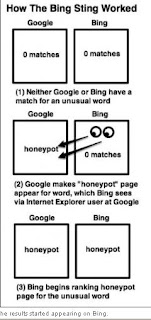Bing Is Cheating, Copying Google's Search Results-: Part 2
To verify its suspicions, Google set up a sting operation. For the first time in its history, Google crafted one-time code that would allow it to manually rank a page for a certain term (code that will soon be removed, as described further below). It then created about 100 of what it calls “synthetic” searches, queries that few people, if anyone, would ever enter into Google.
These searches returned no matches on Google or Bing — or a tiny number of poor quality matches, in a few cases — before the experiment went live. With the code enabled, Google placed a honeypot page to show up at the top of each synthetic search.
The only reason these pages appeared on Google was because Google forced them to be there. There was nothing that made them naturally relevant for these searches. If they started to appeared at Bing after Google, that would mean that Bing took Google’s bait and copied its results.
This all happened in December. When the experiment was ready, about 20 Google engineers were told to run the test queries from laptops at home, using Internet Explorer, with Suggested Sites and the Bing Toolbar both enabled. They were also told to click on the top results. They started on December 17. By December 31, some of the results started appearing on Bing.
Here’s an example, which is still working as I write this, hiybbprqag at Google:
Here’s another, for mbzrxpgjys at Google:
 Here’s one more, this time for indoswiftjobinproduction, at Google:
Here’s one more, this time for indoswiftjobinproduction, at Google:
 To be clear, before the test began, these queries found either nothing or a few poor quality results on Google or Bing. Then Google made a manual change, so that a specific page would appear at the top of these searches, even though the site had nothing to do with the search. Two weeks after that, some of these pages began to appear on Bing for these searches.
To be clear, before the test began, these queries found either nothing or a few poor quality results on Google or Bing. Then Google made a manual change, so that a specific page would appear at the top of these searches, even though the site had nothing to do with the search. Two weeks after that, some of these pages began to appear on Bing for these searches. It strongly suggests that Bing was copying Google’s results, by watching what some people do at Google via Internet Explorer.
The Google Ranking Signal
Only a small number of the test searches produced this result, about 7 to 9 (depending on when exactly Google checked) out of the 100. Google says it doesn’t know why they didn’t all work, but even having a few appear was enough to convince the company that Bing was copying its results.
As I wrote earlier, Bing is far from identical to Google for many queries. This suggests that even if Bing is using search activity at Google to improve its results, that’s only one of many signals being considered.
Search engines all have ranking algorithms that use various signals to determine which pages should come first. What words are used on the page? How many links point at that page? How important are those links estimated to be? What words appear in the links pointing at the page? How important is the web site estimated to be? These are just some of the signals that both Bing and Google use.
Google’s test suggests that when Bing has many of the traditional signals, as is likely for popular search topics, it relies mostly on those. But in cases where Bing has fewer trustworthy signals, such as “long tail” searches that bring up fewer matches, then Bing might lean more on how Google ranks pages for those searches.
In cases where there are no signals other than how Google ranks things, such as with the synthetic queries that Google tested, then the Google “signal” may come through much more.
Do Users Know (Or Care)?
Do Internet Explorer users know that they might be helping Bing in the way Google alleges? Technically, yes — as best I can tell. Explicitly, absolutely not.
Internet Explorer makes clear (to those who bother to read its privacy policy) that by default, it’s going to capture some of your browsing data, unless you switch certain features off. It may also gather more data if you enable some features.
Is It Illegal?
Suffice to say, Google’s pretty unhappy with the whole situation, which does raise a number of issues. For one, is what Bing seems to be doing illegal? Singhal was “hesitant” to say that since Google technically hasn’t lost anything. It still has its own results, even if it feels Bing is mimicking them.
Is it Cheating?
If it’s not illegal, is what Bing may be doing unfair, somehow cheating at the search game?
On the one hand, you could say it’s incredibly clever. Why not mine what people are selecting as the top results on Google as a signal? It’s kind of smart. Indeed, I’m pretty sure we’ve had various small services in the past that have offered for people to bookmark their top choices from various search engines.
Google doesn’t see it as clever.
“It’s cheating to me because we work incredibly hard and have done so for years but they just get there based on our hard work,” said Singhal. “I don’t know how else to call it but plain and simple cheating. Another analogy is that it’s like running a marathon and carrying someone else on your back, who jumps off just before the finish line.”
In particular, Google seems most concerned that the impact of mining user data on its site potentially pays off the most for Bing on long-tail searches, unique searches where Google feels it works especially hard to distinguish itself.
Source : http://searchengineland.com/google-bing-is-cheating-copying-our-search-results-62914
Call Center Services





Comments